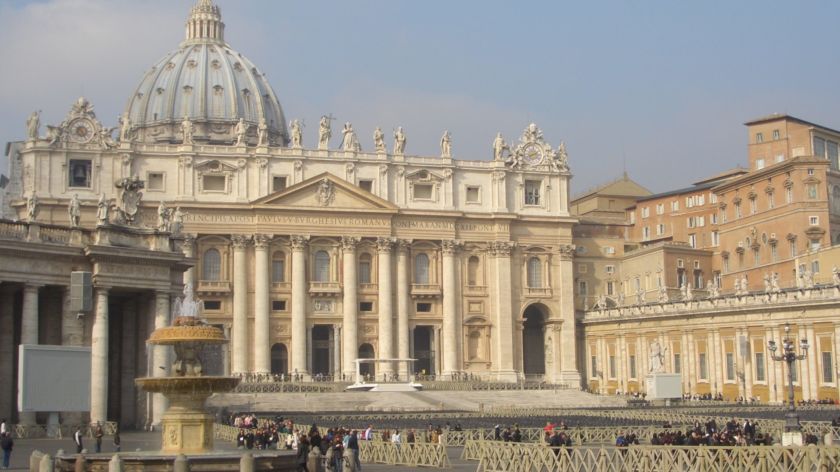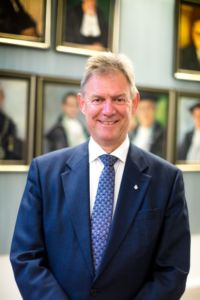Delegation from Nijmegen will travel to Rome for canonisation of Titus Brandsma
-
 Sint-Pietersplein, Rome. Foto: Mat Booth, Flickr
Sint-Pietersplein, Rome. Foto: Mat Booth, Flickr
Former professor and rector magnificus Titus Brandsma will be canonised coming Sunday. A delegation from Radboud University is travelling to Rome to attend the Eucharistic celebration led by Pope Francis. ‘Even without the predicate 'Catholic', our university has a good, informal relationship with the Church,’ says current rector magnificus Han van Krieken.
Former Carmelite priest, professor, and rector magnificus of Nijmegen Catholic University Titus Brandsma (see box) will be canonised in Rome on Sunday. Pope Francis will lead the Eucharistic celebration in St Peter’s Basilica during which, in addition to Brandsma, nine others will be canonised. It is expected that St. Peter’s Square will be filled with pilgrims from all over the world. It is estimated that about 2000 Dutch believers will travel to Rome.
Representatives of the Radboud University will also attend the canonisation ceremony. Besides rector magnificus Han van Krieken, the Nijmegen delegation includes the chair of the supervisory board Merel van Vroonhoven, four deans, mayor Hubert Bruls (see box), employees of the Titus Brandsma Institute and student pastor Jos Geelen.
Rector’s chain
Van Krieken says he feels it is important to be present on behalf of Radboud University.’ Brandsma was a prominent member of our academic community,’ he says. ‘He is now receiving a very special recognition for the way in which he resisted the German occupiers during the Second World War. He will receive this recognition not only in the Netherlands, but all over the world.’
‘Sometimes I wear the same chain as Brandsma’
Van Krieken said he was personally touched by Brandsma’s canonisation. ‘There are a number of photographs of Brandsma on which he is wearing the rector’s chain. Sometimes I wear that same chain, so that I am, as it were, following in his footsteps. But of course I didn’t mean as much as he did.’
Medical miracle
The Church attributes a miracle to persons who are canonised. This is also the case with Brandsma. In 2004, an American Carmelite priest had an aggressive form of skin cancer with metastases, but he was cured. In December 2020, a commission of doctors declared that this was medically unexplainable. Then a group of theologians determined that his healing was due to the adoration of Brandsma.
Mayor also goes to Rome
Mayor Hubert Bruls is also part of the Radboud delegation. ‘On behalf of the university and the municipality we have regular consultations,’ says rector magnificus Han van Krieken. ‘Both as alumnus and as mayor, Bruls is involved with the university. He is part of the delegation because of his role as mayor and because he thinks the canonisation of Brandsma is important for the city.’
According to Van Krieken, himself a pathologist, such a cure need not be a miracle. ‘Every now and then you see that someone with a metastasised form of melanoma is cured,’ he says. ‘This immunogenic tumour often triggers an immune response. Scientists have been researching this for a long time, which eventually led to immunotherapy (a cancer treatment, ed.). From a rational point of view, it is therefore not very surprising that sometimes someone is cured of the disease spontaneously.’
The fact that Brandsma’s canonisation is not based on science, however, is no reason for Van Krieken not to travel to Rome. ‘We are not going to Rome because Brandsma performed a miracle,’ he says. ‘The canonisation is a recognition of his life and his martyrdom during the Second World War. We do not decide what criteria the Church bases this on. The core is the person he was.’
‘No formal relationship with the Church’
The canonisation of Brandsma follows one and a half years after the bishops took away the predicate Catholic from Radboud University. This took place after a long and protracted conflict between the Dutch Bishops’ Conference and the then supervisors of the Catholic University Foundation. For a long time, the bishops refused to appoint many of the directors of the Foundation Board, claiming that they were not Catholic enough. The supervisors then went to court. The judge agreed, after which the bishops decided that the university could no longer use the predicate ‘Catholic’.
Does attending the canonisation ceremony in Rome mean that the folds between university and Church have been smoothed out again? ‘As the Executive Board, we have always said that we respect the decision of the bishops, but that we also like to continue our dialogue with the Church,’ says Van Krieken. ‘The relationship has changed in a formal sense, but not in an informal one. For example, we still have good contact with the Bishop of Den Bosch, Gerard de Korte.’
‘The formal role that bishops had in relation to the Foundation Board will not return’
According to Van Krieken, it is therefore out of the question for Radboud University to regain the bishops’ designation. ‘The formal, statutory role that bishops had in relation to the Foundation Board, which is now the Supervisory Board, has been cut off and will not return,’ he says. ‘But our academic community will retain a special connection with the Church and with our Catholic background.’
Who was Titus Brandsma?
Titus Brandsma was a Carmelite priest, academic and publicist from Bolsward in Friesland. As a professor, he specialised in medieval mysticism. In the academic year 1932-1933 he was rector of the Catholic University Nijmegen (now Radboud University). During the war, he forged an alliance between publishers of Roman Catholic newspapers to refuse advertisements of the NSB (Dutch traitors who supported the Nazi occupiers). Brandsma was arrested on 19 January 1942 and died in the Dachau concentration camp on 26 July of that same year. Later this week, Vox will publish a large article on Titus Brandsma.





Nico van Oudenhoven schreef op 12 mei 2022 om 11:53
Thanks for allowing me access to your nice and meaningful information. Keep on walking. Nico